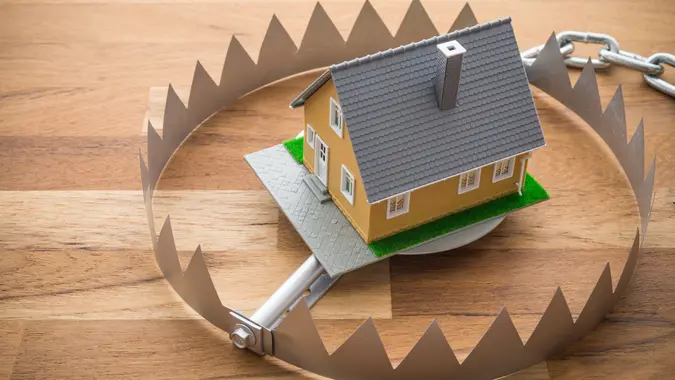5 Ways a 50-Year Mortgage Could Destroy (or Grow) Your Wealth

Commitment to Our Readers
GOBankingRates' editorial team is committed to bringing you unbiased reviews and information. We use data-driven methodologies to evaluate financial products and services - our reviews and ratings are not influenced by advertisers. You can read more about our editorial guidelines and our products and services review methodology.

20 Years
Helping You Live Richer

Reviewed
by Experts

Trusted by
Millions of Readers
One way President Donald Trump aims to make homes more affordable for Americans is by creating a 50-year mortgage — an idea Bill Pulte, the U.S. Director of Federal Housing, called a “game changer” in an X post.
Although, right now you can’t get a 50-year mortgage from major lenders due to regulatory policies included in the Dodd-Frank Act, according to Realtor.com.
If such a mortgage were available, it would be a huge game changer for home buyers who currently can’t get mortgages longer than 30 years. The question is whether that change would be for good or ill. Below are five ways a 50-year mortgage could potentially destroy (or grow) your wealth.
Also here are exact ways Trump can control mortgage rates.
You’ll Have a Lower Monthly Payment — But at a Steep Cost
One thing most everyone agrees on is that many house hunters have been priced out of the market due to home values that continue to hover near record highs, according to Federal Reserve Economic Data (FRED).
The main financial advantage of a 50-year mortgage is that it would lower your monthly mortgage payment, making home ownership more affordable.
Using the MortgageCalculator.org tool, GOBankingRates found that you could save nearly $230 a month on your mortgage payment based on the following criteria:
- Home price: $400,000
- Down payment: $80,000 (20%)
- Loan amount: $320,000
- Mortgage rate: 6.22%
- PMI: Not applicable
- Annual property taxes: $3,000
- Annual home insurance: $1,500
- Start date: November 2025
Here’s what your payment would be on the following loan terms:
- 30-year mortgage: $2,339 a month
- 50-year mortgage: $2,112 a month
- Difference: $227 a month
Those savings might look good on paper, but they don’t tell the whole story.
The 30-year mortgage would result in a total of $842,040 in payments over the life of the loan. For a 50-year mortgage, the amount would be $1,267,200 — meaning you would spend $425,160 more in return for a lower monthly payment.
You’ll Pay a Lot More in Additional Interest
Spreading out a mortgage over an additional 20-plus years might help you save money each month, but those savings would be easily wiped out by the additional interest you’d have to pay over the term of the loan.
An analysis from UBS found that as a percentage of the total home price, a 50-year mortgage results in total interest paid being of roughly 225% of the total home price. That’s more than twice the level under a 30-year mortgage.
This cost alone would do major damage to the finances of many home owners and even their offspring, according to Chad Cummings, attorney and certified public accountant (CPA) at Cummings & Cummings Law, who previously worked in finance and tax with American Airlines, PwC and JPMorgan Chase.
“In reality, borrowers could pay more than triple the purchase price over time (as opposed to ‘only’ double on the 30-year mortgage), eroding long-term wealth and equity accumulation,” he told GOBankingRates. “It is not a stretch to say that the 50-year mortgage is a back-door estate tax on families that will significantly reduce, if not outright preclude, bequests to family members upon parents’ passing. This will have generational effects.”
You’ll Have Less Equity
Another big disadvantage of a 50-year mortgage is how little equity beyond the initial down payment is generated.
UBS found that with a 50-year mortgage, only 4% of the mortgage is paid off in 10 years and only 11% is paid off even after 20 years. That compares to 46% after 20 years under a 30-year mortgage.
You Might Never Actually Own the Home Outright
Another drawback of a 50-year mortgage is that most homeowners probably won’t live long enough to enjoy the full equity benefits by finally paying the loan off.
The median age of first-time home buyers rose to 40 in 2025, Realtor.com reported. You’d have to live until age 90 to pay off a 50-year mortgage. The problem is, the average life expectancy in the United States is only 78.4 years, according to the National Center for Health Statistics.
It Still Might Be Better Than Renting
If the idea behind a 50-year mortgage is to make home ownership available to more Americans, then it could still have a financial benefit over renting, according to Realtor.com. This is mainly because you’ll still be building some equity, however slowly.
“As long as these mortgages are soundly underwritten, homeowners could still build equity through home price appreciation, as has historically occurred,” said Lawrence Yun, chief economist at the National Association of Realtors (NAR).
Editor’s note on political coverage: GOBankingRates is nonpartisan and strives to cover all aspects of the economy objectively and present balanced reports on politically focused finance stories. You can find more coverage of this topic on GOBankingRates.com.
 Written by
Written by  Edited by
Edited by 

























